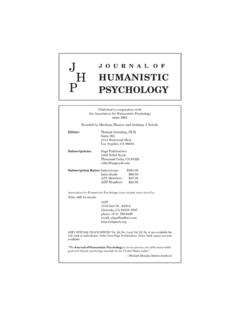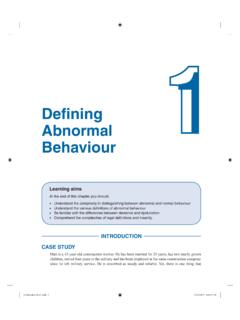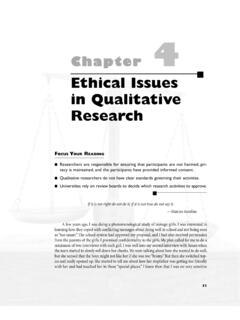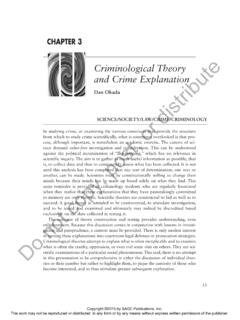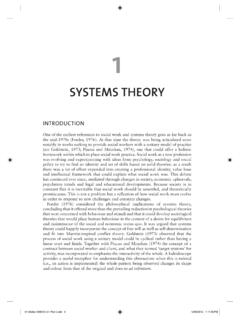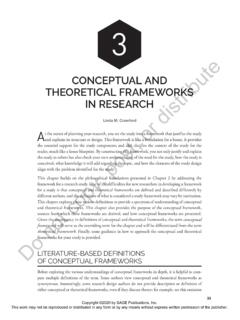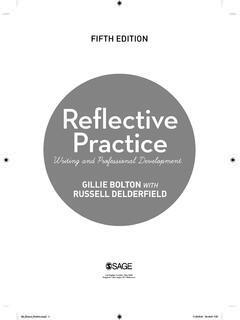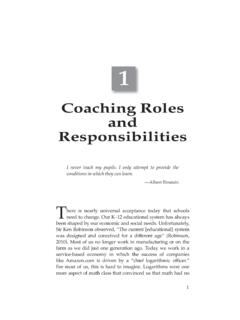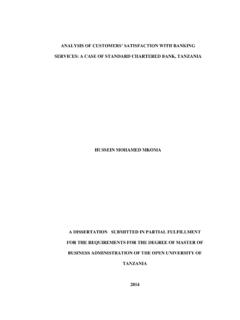Transcription of The Beginner’s Guide to Counselling & Psychotherapy
1 SAGE was founded in 1965 by Sara Miller McCune to support the dissemination of usable knowledge by publishing innovative and high-quality research and teaching content. Today, we publish more than 750 journals, including those of more than 300 learned societies, more than 800 new books per year, and a growing range of library products including archives, data, case studies, reports, conference highlights, and video. SAGE remains majority-owned by our founder, and after Sara s lifetime will become owned by a charitable trust that secures our continued Angeles | London | Washington DC | New Delhi | Singapore The Beginner s Guide to Counselling & PsychotherapySecond editionEdited by Stephen 31/21/2015 5:38:06 PM1An Introduction to Counselling and PsychotherapyColin Feltham and Stephen PalmerIn recent years both Counselling and Psychotherapy have been demonstrated on television with real clients and discussed on radio programmes.
2 There are numerous YouTube clips illustrating therapy too. So it is very likely most people today probably have at least some notion of what Counselling is, since the term is now used so widely. However, misunderstandings and disagreements still abound about what the differ-ences are between advice giving, Counselling , Psychotherapy , coaching, mentoring and similar terms. Although we cannot go into it all here, it is true to say that a whole host of activities, professions and relationships, from befriending, co- Counselling and mutual aid groups, to clinical psychology, Counselling psychology, coaching psychology, psychiatry and social work, in some ways resemble and overlap with each other. In this chapter we will focus on understandings of Counselling skills, Counselling and Psychotherapy , before going on to look succinctly at different SKILLST erms such as Counselling skills, communication skills, interpersonal or relationship skills are often but not always used interchangeably.
3 It is sometimes thought that there are certain communication and relationship-building skills that all or most approaches have in common, and these tend to be skills used intentionally in con-versation towards certain helpful ends. Counselling skills may be said to differ from everyday, casual conversation in the following ways. While much ordinary conversation is characterized by rather casual, perhaps some-what inattentive listening, a key Counselling skill is active listening, which involves the conscious discipline of setting aside one s own preoccupations in order to 41/21/2015 2:44:45 PM5 Introduction to Counselling and psychotherapyconcentrate as fully as possible on what the other person is expressing. This may involve a high level of awareness of one s own prejudices and idiosyncrasies. While ordinary conversation may contain a great deal of interaction, anecdotes, sharing thoughts and ideas and changing the subject aimlessly, another key coun-selling skill involves the discipline of responding mainly to the other person, in a purposeful, non-judgemental and often rather serious way, which tends to mean that such conversation usually has a somewhat one-way character.
4 While ordinary conversation is not usually constrained by any agreements about confidentiality, Counselling skills are usually backed up by either an implicit or explicit understanding about confidentiality. While ordinary conversation is often thought to be natural and to have no par-ticular rules governing it, Counselling skills may often feel or be experienced as somewhat unnatural. For example, the person using Counselling skills may strive to understand very accurately and demonstrate this striving by sometimes repeat-ing parts of the other s statements in order to clarify or deepen understanding. Finally, while much ordinary conversation wanders across many subjects with no nec-essary goal, Counselling skills are generally associated with some sort of goal, be it helping with decision making, offering an opportunity to discharge emotions, offer-ing alternative interpretations or suggesting strategies for making desired there is some disagreement about the extent to which Counselling skills may be possessed naturally by many people, it is widely (although not universally) believed that the skills have to be identified, understood, learned and practised repeat-edly if one is to be able to be a consistently good listener and effective helper.
5 Also, it is important to remember that while skills of this kind may be learned by many pro-fessionals, sometimes for their own ends (for example, salespeople intending to win customers over), the use of Counselling skills is properly associated with therapeutic, helping or healing ends and not with self-centred skills may be used in all sorts of situations in the classroom, at a hospi-tal bedside, in training settings, or at bus stops or parties! In other words, they may be used within professional contexts, in voluntary work, or simply in everyday social and domestic settings, when someone is trying to listen in a disciplined manner, to be as helpful, constructive or interested as possible. Fairly typically, students on Counselling skills courses may be nurses, teachers, ministers of religion, residential social workers and similar professionals, as well as those engaged in voluntary work.
6 Typical too on Counselling skills courses is some sort of model (three or five stages of the helping process) drawn from the ideas of Gerard Egan (Emeritus Professor of Psychology and Organizational Studies), Richard Nelson-Jones ( Counselling Psychologist), Sue Culley (Counsellor) and others, usually advocating systematic practice in basic and advanced empathy, paraphrasing, summarizing, open questioning, challenging and so differs in its formality from interactions where Counselling skills are used. Counselling is generally characterized by an explicit agreement between a counsellor and client to meet in a certain, private setting, at agreed times and under disciplined 51/21/2015 2:44:45 PM6 Guide to Counselling & psychotherapyconditions of confidentiality, with ethical parameters, protected time and specified aims. In the past decade the setting has become more flexible, with the advent of internet-based therapy websites, and Voice-Over-IP providers such as Skype and (although not always) the counsellor will have had a certain level of train-ing (beyond the level of a certificate in Counselling skills, typically a diploma or above), will belong to a professional body with a published code of ethics and will receive confidential supervision for her or his Counselling .
7 In some countries state licensure exists, such as in the USA, which is independent of the professional bodies. (See Appendix 1 for a list of professional bodies.)It is widely accepted that Counselling may be a suitable form of help for a variety of personal problems or concerns, the most common being depression, anxiety, stress, bereavement, relationship difficulties, life crises and traumas, addictions, self-defeating behaviour and thwarted ambitions. It can help with issues of loss, confusion and other negative conditions or it may also be used more proactively and educationally to learn, for example, how to relax, be more assertive, deal with stress and lead a more fulfilling is not essential to know where Counselling comes from etymologically, his-torically and so on, but it probably does help to consider a few facts. The term itself does of course stem from the verb to counsel , which has always meant to advise, so it is not surprising that some people still have this misconception about Counselling .
8 Although some forms of Counselling contain some advice-giving com-ponents, Counselling is mostly dedicated to enhancing or restoring clients own self-understanding, decision-making resources, risk taking and personal growth. Telling people what to do is therefore usually eschewed as a short-term and often counterproductive , a great deal of Counselling in Britain has been associated with the non-directive, client-centred approach of the psychologist and psychotherapist Carl Rogers, and indeed we have to thank Rogers as one of the most active promoters of Counselling in the USA. Many early British counsellors, too, took their ideas and training from Rogers approach which, as we shall see later in this book, rests heav-ily and optimistically on belief in the innate resourcefulness and goodness of human beings. But it is important to know that hundreds of different theoretical approaches to Counselling now exist (see Appendix 2), many of which do not share Rogers views, and some of which may be almost diametrically opposed to Rogers.
9 In some countries, such as England and Wales, there has been an increasing demand by the National Health Service (NHS) for counsellors to practise brief cognitive behavioural therapy in order to limit therapeutic costs. Counselling can be seen as a very broad and potentially confusing field of learning may help when you come to consider differing approaches to Counselling and Psychotherapy to remember that each is necessarily an imperfect product of a certain time and place, which in its own way strives to make sense of distress and to promote methods of effective help. While each approach emphasizes certain aspects of human functioning and therapeutic skills, it has been argued that most depend on common factors such as a healing (second chance) relationship, a good fit between client and counsellor, the readiness of clients to be helped, the belief of clients and counsellors in the efficacy of Counselling , and the plausibility of espoused 61/21/2015 2:44:45 PM7 Introduction to Counselling and psychotherapyPSYCHOTHERAPYDo not despair or blame yourself if you are confused by the differences between Counselling and Psychotherapy ; the alleged differences are indeed confusing and even many of the most prominent practitioners disagree.
10 Psychotherapy originally referred to a less intense form of psychoanalysis and is still understood by some professionals as being, properly speaking, psychoanalytic Psychotherapy only. However, the client-centred or person-centred approach is referred to as both Counselling and psycho-therapy, usually without distinction. Various forms of brief Psychotherapy challenge the simplistic claim that Psychotherapy is long term and Counselling is brief. It is probably advisable to ask anyone who uses the term Psychotherapy exactly how they are using it, and with what justification!Most Psychotherapy , like Counselling , is fundamentally talking-based therapy, rest-ing on psychological contact, theories and techniques. It is ultimately difficult to distinguish between Counselling and Psychotherapy , and indeed other similar practices.[C1Q1]1 None the less, it is important to accept that some practitioners (mainly those trained as psychotherapists) strongly believe in significant differences.
